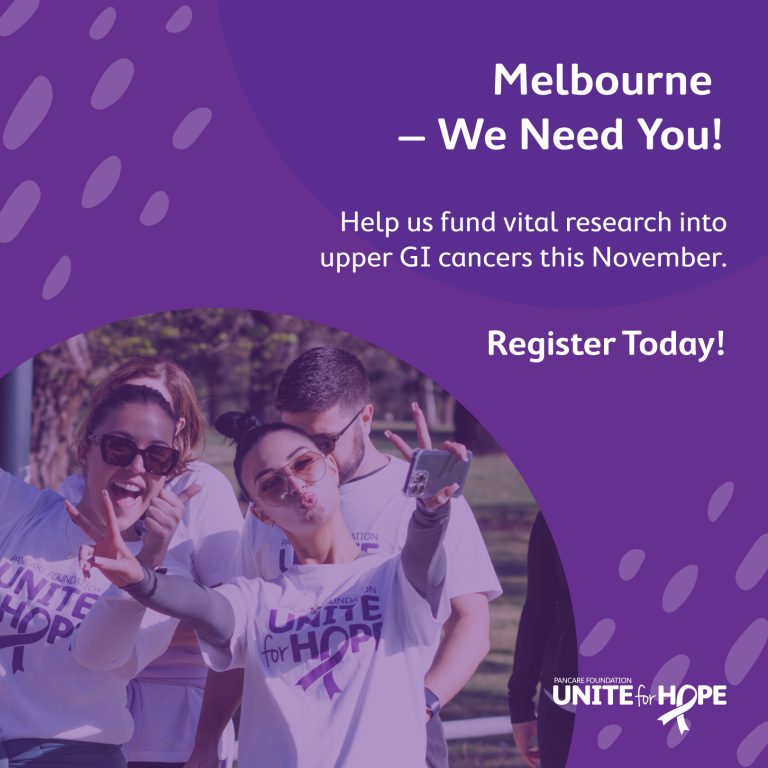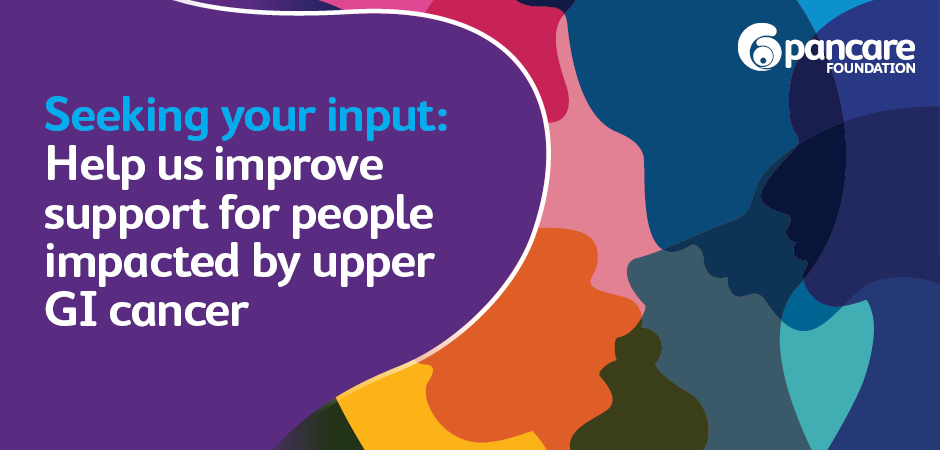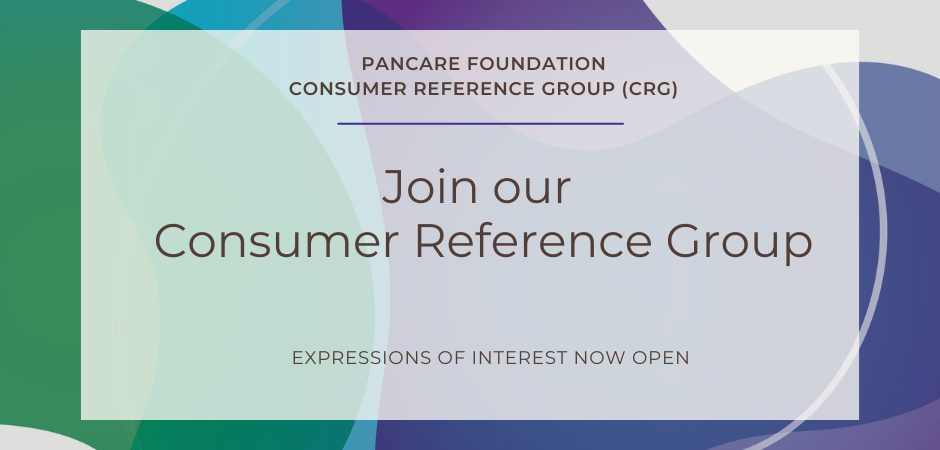We fund world-class research
Pancare Foundation funds world-class research at some of Australia’s most respected and innovative institutions. Our Research Strategy promotes a research program that is overseen by our Medical Advisory Committee and underpinned by six key focus areas that will help us achieved improved survival rates and quality of life for those affected by upper gastrointestinal (GI) cancers.
Discover new treatments
Novel therapies for treatment of locally advanced and metastatic disease and for prevention of cancer recurrence.
Currently, surgery is the only way that many upper gastrointestinal (GI) cancers can potentially be cured. In many cases, a combination of surgery – when possible – and chemotherapy may be recommended. Existing medicines, including chemotherapy, to treat upper GI cancers often only provide small benefits in terms of survival outcomes, and while we have seen new medicines that have given families more time together, there haven’t been any dramatically significant advances in upper GI cancer treatments for decades.
Other cancers have seen great progress in the development of new medicines and new types of treatment that can substantially improve chances of survival – we desperately need to see the same with upper GI cancer treatments.
Pancare supports research aimed at discovering and understanding novel therapeutic targets and novel therapeutic delivery methods for upper GI cancer. This is a promising area of research that is delivering the framework of breakthroughs in new treatments that will be game-changers for those impacted by upper GI cancer. For example, there has been great interest in therapies that target the genetic changes within the cancer. This research needs funding to progress and deliver these much-needed advancements.
Early detection
Strategies through identification of biomarkers and screening protocols for general population and those at high risk.
There are currently no early detection screening options for most people with an upper GI cancer or the general population.
Often patients have vague symptoms such as non-specific abdominal discomfort or unexplained weight loss, that can easily be associated with various other conditions. Other presenting symptoms such as jaundice (yellowing of the skin and eyes), unexplained development of diabetes, although more specific, do not guarantee early diagnosis.
Risks factors for upper GI cancers are broad and include, but not limited to smoking, diabetes and obesity. Only about 10 to 15% of cases have a genetic or familial component to them.
We are working tirelessly with clinicians and scientists to fund research programs that identify new methods of early detection for upper GI cancers, including screening techniques for high risk individuals and development of biomarkers.
Personalised medicine strategies
New approaches to better manage patients’ health and target therapies to achieve the best outcomes in the management of a patient’s disease or predisposition to the disease.
Personalised medicine is an evolving field in which physicians use diagnostic tests to identify specific biological markers, often genetic, that help determine which medical treatments and procedures will work best for each patient.
Pancreatic, liver, stomach, biliary and oesophageal cancers are not the same in everyone, and so every patient deserves treatments that reflect that.
Ideally, patients should be offered treatments that are most likely to work based on the type of cancer they have. This will give everyone the best chance of survival, without going through unnecessary treatment.
Our aim is to fund research that will bring us closer to matching the right treatment with each person in order to get the best outcomes.
Optimal patient care
Research designed to reduce variations in the care of patients.
The pathway for cancer patients undergoing diagnosis and treatment for cancer is complex. It usually involves multiple healthcare providers and covers a range of institutions, both public and private. In Australia, patients and health providers have Optimal Cancer Care Pathways, which are documents outlining this journey for specific tumour types, aiming to foster an understanding of the whole pathway and its distinct components to promote quality cancer care and patient experiences. These pathways act as a reminder that the patient is the constant in this journey and that the health system has a responsibility to deliver the care experience in an appropriate and coordinated manner. Following the optimal care guidance can lead to better outcomes and quality of life for patients with upper GI cancer.
Our goal at Pancare is to fund research that drives the delivery of optimal patient care across Australia, such as clinical quality registries. A major focus of Pancare support, the Upper Gastrointestinal Cancer Registry (UGICR) run by Monash University is a large patient registry designed to reduce variations in cancer care across Australia.
Support future leaders
Attract the brightest and the best to the field of pancreatic and upper GI cancer research.
To make sustainable improvements to the lives of people with an upper GI cancer, we need to train our professors of the future, now. We call them our Future Leaders.
An important part of the Pancare work has centred on scholarships for science and medical graduates to undertake PhD projects directly related to pancreatic and upper GI cancers. By funding researchers at different stages of their careers, we support new and creative ideas to come to fruition and ensure that the best researchers are ready to make the difference that we need in years to come, as well as right now.
We want to attract new and passionate researchers to deliver innovations in upper GI cancer research. With your help through Scholarships and Early-career research grants, we can fund excellent research and support the best and brightest minds of the future.
Support clinical trials
Approaches that increase accrual of patients into well-designed clinical trials.
Clinical trials are a type of research study that determine whether new treatments developed in the laboratory are beneficial to people living with pancreatic cancer. Data from successful clinical trials will determine whether an experimental treatment should be approved for a specific disease or disorder, such as upper GI cancer.
In the fight against upper GI cancers, clinical trials often provide the best treatment options, and they give patients early access to cutting-edge treatments that can lead to progress in research, improved treatment options and better outcomes. The treatments that are available as standard-of-care today were approved after successful clinicals trials.
Pancare strongly recommends patients and their doctors discuss the clinical trials available at diagnosis and again when every treatment decision is being made. We are working in several partnerships to develop the highest impact clinical trials for upper GI cancers and provide the patient-focused resources that will help people affected by upper GI cancer know not only what trials are available, but also how to speak with your doctors about trials.
Advancing outcomes and innovation through clinical research
Since our inception, we have supported nine significant research projects. Our goal over the next five years is to invest an additional $5 million into our research programs that will help achieve a better understanding of upper GI cancers.
Pancare selects research projects for funding that align with our research strategy. Cancer research programs that we fund relate to key focus areas that will have the greatest impact on Australians impacted by upper gastrointestinal cancers.
Learn more:
> Learn more about the current research we fund






